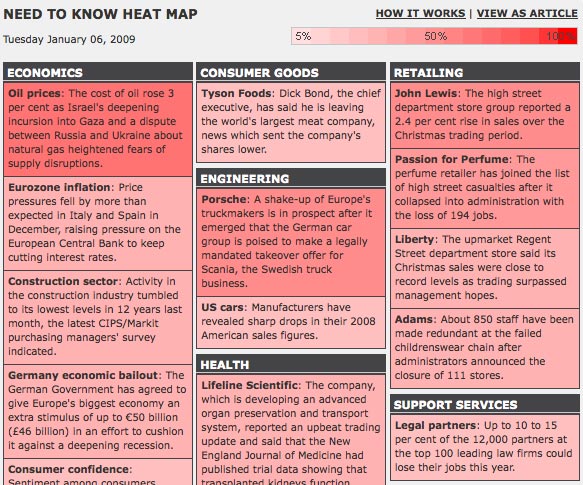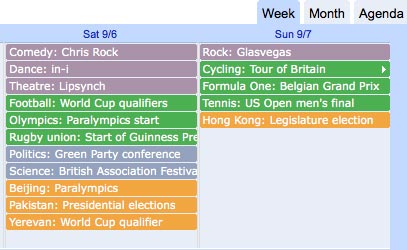“Embattled newspaper publisher Independent News & Media (IN&M) this afternoon confirmed that it was close to unveiling a financial rescue that would allow the owner of The Independent to pay off an overdue €200 milion bond,” reports TimesOnline. Full post at this link…
Tag Archives: TimesOnline
How much is too much? Defining the grey areas in attribution and linking
As the mainstream media shifts to writing more online content, its standards and guidelines are up for discussion. Just how much of other people’s work on external sites can/should you use and how should you attribute in articles?
Stephen Hutcheon, of the Sydney Morning Herald, flagged up an issue in a blog post on February 5. He is not happy with the way material from an interview he conducted with GoogleEarth (30/01/09) was used in an article on TimesOnline by Mike Harvey (30/01/09) – the latest version of which is at this link.
Hutcheon’s account can be read at this link with a screen grab of the Times’ original article.
The original Times piece shows the Sydney Morning Herald was named in the third paragraph, and, later in the piece, it again specified ‘Mr Hanke told the newspaper’.
Hutcheon had two complaints:
- Firstly, that Harvey had not linked to his original article.
- Secondly, the proportion of the article made up of Hutcheon’s quotes, which Hutcheon feels weren’t adequately labelled as his own work.
According to Hutcheon, Mike Harvey then contacted him with a ‘sincere apology’. “He said it was not his publication’s policy to link back to original articles but said that as a gesture of goodwill, they would do it.”
The TimesOnline article now has a link to the original SMH article, but Hutcheon remains unsatisfied:
“I told him I accepted his apology. However, he made no mention about my central complaint about the amount of material he lifted, nor does he appear to have cut out any from his piece. But that’s about as much as I can do. That, I told him, was an ethical matter between him and his editors.”
Journalism.co.uk asked Hutcheon about his own paper’s linking policy, via email. Hutcheon said:
“My issue is less with the lack of a link. We [SMH] don’t have a hard and fast policy on links. If we quote a par or so, no need to reference where it came from. But if we write a story about this amazing thing someone’s photographed or found, or written and the story is largely based on the other person’s discovery or effort, then yes. It’s a bit like writing about a YouTube video without pointing readers to it. Mike apologised but failed to cut back the almost 500 words – most of them direct quotes from my one-on-one interview with John Hanke. If traditional news organisations are prepared to let their reporters get away with this type of cheap journalism, then it’s a race to the bottom and we’re all doomed. If everyone just copies everyone else, who is left to do the original reporting?”
Journalism.co.uk contacted Tom Whitwell, assistant editor of TimesOnline to clarify the situation.
He said the Times’ linking policy was being worked on and while there ‘was no official linking policy’, journalists could link to other work at the moment.
However, he said, the subbing system and workflow in place – used for online as well as print work – meant links often got omitted. But ‘the general policy would be to link out to things’, he said.
“In terms of the principle I’m extremely firm that [we link] not as courtesy, but as service to the readers.”
In regards to the proportion of quotes used, Whitwell said:
“I think it’s fairly clear that he [Hanke] was talking to the Sydney Morning Herald (…) that particular example is reasonable.
“This isn’t something we do often as a policy. We don’t have a policy to do this regularly – I think in this particular instance it’s fairly clear to the reader what the story is.
“We do need to have a clear written policy at what point we link, and I’m in the process of putting that together. That to me, is interesting, the motivations for linking. To me, it’s purely about providing the service to readers (…) a better way of telling the story. The idea that it’s good manners, legally crediting something, isn’t the key thing for me.
“It is very different for online than print (…) I don’t want to get into the way some other newspapers operate, which is rather different from the way we operate, in terms of using material from other sites. In some sites there is real culture of picking up stories from lots and lots of places, constantly, as a matter of course. That’s not something we usually do,” Whitwell said.
The problem with linking arose in the production system, he said, which “has no way of capturing URLs, a purely manual process – I suspect this piece went through this process. We need to work out how to get the process to work.” Getting more links into place is ‘tricky’, but ‘not impossible’, he added.
Journalism.co.uk also contacted the Times piece’s author Mike Harvey, who did not respond by email.
Here’s an example where a paper did not attribute at all: a case over at Regret The Error, involving the NY Daily News, in which an accusation was made that material had been lifted from the Express-News, ‘without attribution’, for a piece on NYDailyNews.com.
A later amendment at NYDailyNews.com noted that ‘An earlier version of this story should have attributed quotes by certain individuals to reporting by the San Antonio Express-News.’
Hutcheon’s post hasn’t yet received any comments; perhaps this one is up for debate? Just how much is too much?
TimesOnline tells us what we need to know
Not in the Reithian sense… but using the rather nifty feature pictured below:

The Need to Know heatmap gives an overview of current business stories (Monday-Saturday) and indicates their ‘heat’ as generated by reader interest.
TimesOnline: Beijing internet cafe users must have photo taken
All visitors to internet cafes in Beijing will be required to have their photographs taken, the Chinese government has decided. By mid-December all internet cafes in the main 14 city districts must install cameras to record the identities of their web surfers, who must be 18 or over.
Times creates Google Calendar for news agenda
Tom Whitwell, communities editor for TimesOnline, dropped me a line to say he and intern John McGovern have created a Google Calendar diarising all of the title’s news agendas.
The calendar merges events published in the Times Agenda covering world affairs, business, arts and sport – all colour-coded.

Data from other news sections will be added and if you’ve already got a personal Google calendar you can add dates from the agenda to your own.
Mirror’s video partnership with Roo ‘a bloody mess’ claims former site editor
UPDATE: take our poll on whether or not video journalism can save the newspaper
The Mirror‘s partnership with Roo Media to deliver more video content on its site has been described as ‘a bloody mess’ by former site editor Steve Purcell.
His comments, which form part of Neil Thurman and Ben Lupton’s academic report into multimedia storytelling by British news websites, were made last year – shortly after a video player supported by Roo’s technology was introduced to the site.
“The promises that were made by [our content partner, Roo Media] didn’t materialize…. It was a bloody mess, relying on American led stuff,” Purcell told the report, which questioned leading editors on newsroom convergence, video and audio content, multimedia training and the potential for advertising within digital content.
An additional interview with Anne Spackman, editor of TimesOnline, highlighted similar concerns over the launch of video with Roo on the site.
“We didn’t have a sense of ownership of the player… When those early deals were done nobody knew what people would want to watch on a site like ours…”
Part of the problem, said Spackman, was that providers did not understand what video content would work well alongside a text story on the site.